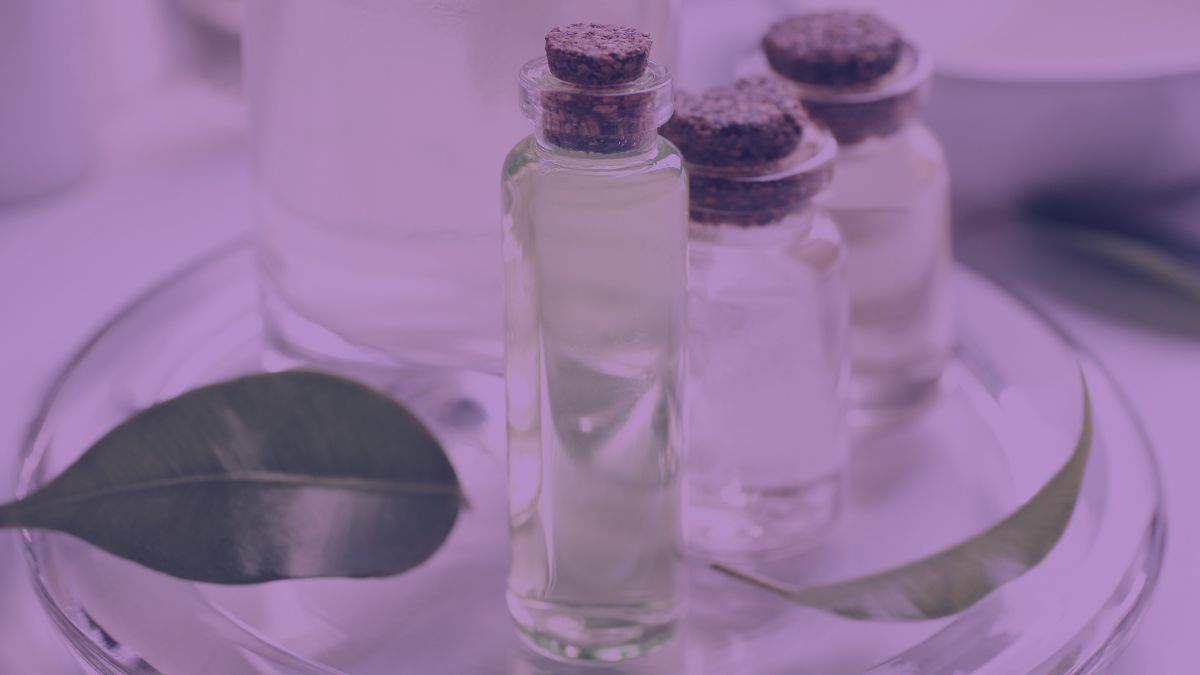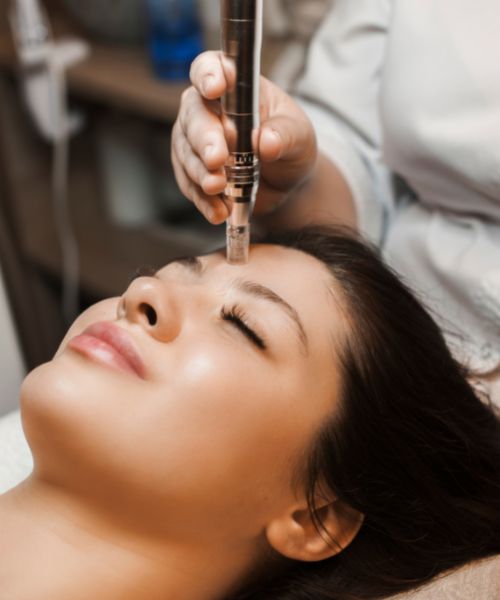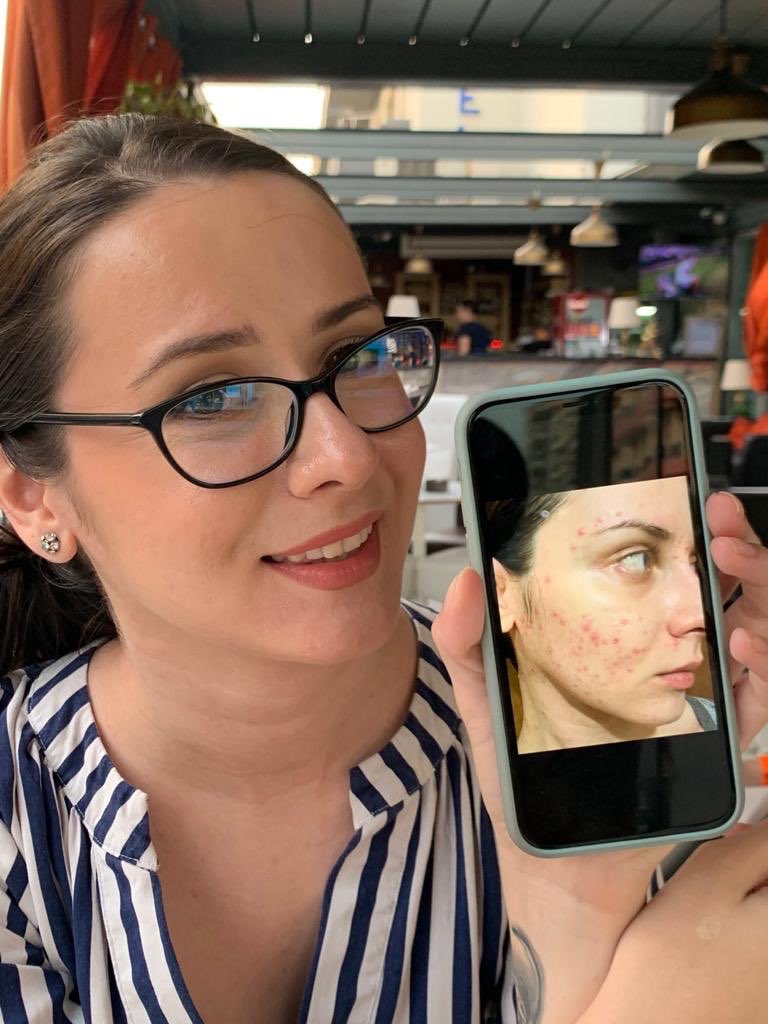The journey from battling acne to addressing its aftermath, particularly acne scars, often leads many to natural remedies like tea tree oil.
Given its reputation for treating active acne, it’s not surprising that individuals turn to this essential oil in hopes of fading acne scars.
However, while effective for soothing inflammation, tea tree oil doesn’t have the same beneficial effect on acne scars.
Therefore, if you are interested in using tea tree oil to get rid of acne scars, continue reading to find out why it doesn’t work and what alternatives you should consider to improve your skin’s health and appearance.

What is Tea Tree Oil?
Tea tree oil, derived from the leaves of the Melaleuca alternifolia tree native to Australia, is an essential oil recognized for its antiseptic and anti-inflammatory properties.
It has a distinct, slightly medicinal scent often associated with cleanliness, resonating with those seeking natural skincare solutions for many skin concerns.
However, when it comes to treating acne, tea tree oil is not just a passing trend – it has been scientifically proven to be effective due to its active ingredient, terpinene-4-ol, a component with potent antioxidant, antibacterial, and anti-inflammatory properties.
This active component can help inhibit the overgrowth of bacteria inside the pores while also reducing the redness and inflammation associated with acne.
Unlike some harsher acne treatments, tea tree oil offers a gentler approach to calming the skin.
However, it is important to remember that tea tree oil should always be used with caution, as, like any essential oil, it can cause skin irritation and allergies in some individuals.
Can Tea Tree Oil Fade Acne Scars?

Tea tree oil has antimicrobial and anti-inflammatory properties that are beneficial for acne; however, these do not extend to its ability to fade acne scars.
Acne scars, especially atrophic scars, such as icepick, boxcar, and rolling scars that leave an indentation in the skin or cause changes in skin texture, require treatments that promote skin regeneration and repair.
While tea tree oil is excellent for reducing inflammation and bacterial growth, it doesn’t possess the necessary properties to stimulate skin cell renewal or collagen production, which are vital in the healing process of scarred tissue.
Moreover, pigmentary acne scars, such as post-inflammatory hyperpigmentation (PIH), need ingredients inhibiting melanin production to fade the darkened skin effectively.
Tea tree oil lacks these melanin-inhibiting properties, making it less effective for treating pigmentation-related scars.
Finally, when it comes to post-inflammatory erythema (PIE), which are the red or purplish marks that linger after an acne breakout, tea tree oil may help reduce inflammation and promote healing; however, these scars are a result of ruptured blood vessels and require time to heal on their own.
With that said, while tea tree oil remains a valuable ally in the fight against active acne, its healing properties have limitations that can make it a less-than-ideal option for fading acne scars.
The Best Ways to Use Tea Tree Oil for The Skin
Tea tree oil, with its impressive antiseptic and anti-inflammatory properties, can be a valuable addition to your skincare routine when used correctly.
The key to harnessing its benefits without experiencing adverse effects lies in the application method.
Here are the best ways to use tea tree oil for the skin:
Opt for Skincare Products Containing Tea Tree Oil
The safest and most effective way to incorporate tea tree oil into your skincare regimen is through products that already contain it.
These include cleansers, toners, and spot treatments that contain tea tree oil in diluted, skin-safe concentrations.
This approach ensures that you reap the benefits of the oil without the risks associated with its undiluted form.
Avoid Direct Application of Pure Essential Oil
Applying pure tea tree essential oil directly to the skin can be harsh and may lead to irritation, sensitivities, and even allergic reactions, especially for sensitive skin.
Additionally, diluting tea tree oil to make it less potent is also not the best approach to treating an active pimple, as attempting to create your mix can result in an ineffective or even harmful formula.
This is because getting the correct ratio of tea tree oil to a carrier oil without professional knowledge or any familiarity with how each brand formulates its products and incorrect dilution could either diminish the benefits of the oil or increase the risk of skin irritation.
Therefore, it’s safer and more effective to use pre-formulated skincare products that contain the appropriate concentration of tea tree oil.
Follow Product Instructions
Always adhere to the usage instructions provided on skincare products containing tea tree oil.
Overuse can lead to skin dryness and irritation, so following recommended frequencies and quantities is essential.
You should also pay attention to your skin’s reaction to a tea tree oil product.
If you start to notice your skin is getting irritated and sensitive and is showing signs of redness, peeling, flaking, and dryness, this is probably a symptom of intolerance, which means you should either reduce the frequency of use or stop using the product altogether.
The Side Effects of Using Tea Tree Oil
While tea tree oil is renowned for its beneficial properties in skincare, particularly for acne treatment, it is not without its potential side effects.
Being aware of these can help users make informed decisions and use the product safely.
Irritation and Allergic Reactions: Tea tree oil can be potent and may cause skin irritation, redness, and itching, particularly in sensitive skin. A patch test is recommended before regular use.
Interactions with Other Skincare Ingredients: Tea tree oil can interact with other skincare ingredients, potentially reducing their effectiveness or increasing skin irritation, so it’s crucial to consider your entire skincare routine when using it.
Phototoxicity: Some individuals may experience increased sensitivity to sunlight (phototoxicity) after applying tea tree oil, which can increase the risk of sunburn.
The Best Alternatives for Treating Acne Scars
While tea tree oil may not be effective in treating acne scars, several effective alternatives exist, ranging from topical solutions to professional treatments.
Each type of scar, whether pigmentary or atrophic, responds differently to these treatments.
Topical Treatments for Pigmentary Acne Scars
Niacinamide
Niacinamide is a versatile skincare ingredient known for its ability to lighten dark spots and even out skin tone.
It works by reducing melanin production, making it effective against hyperpigmentation.
Retinoids
Retinoids are effective in promoting skin cell renewal.
This aids in the production of new, healthy, and even cells and encourages the shedding of old, damaged, and pigmented cells.
Additionally, retinoids not only help fade dark spots but also improve overall skin texture.
Azelaic Acid
Renowned for its anti-inflammatory properties, azelaic acid effectively reduces the appearance of post-inflammatory redness and lightens post-inflammatory hyperpigmentation.
Glycolic Acid
As an alpha-hydroxy acid, glycolic acid exfoliates the skin’s surface, promoting the shedding of pigmented cells and revealing brighter, more even-toned skin underneath.
Topical Treatments for Atrophic Acne Scars
Peptides
Peptides in skincare stimulate collagen production, which is essential for filling in atrophic scars and improving skin texture.
Retinoids (Tretinoin)
Specifically, tretinoin, among other retinoids, is highly effective in remodeling the skin and reducing the depth of atrophic scars over time by promoting collagen production.
This will help slightly fill up the indentations and make this type of acne less prominent.
Professional Treatments for Acne Scars

Microneedling
Microneedling involves creating micro-injuries on the skin to stimulate collagen production.
This method is particularly beneficial for atrophic scars, as it promotes skin regeneration from within.
Laser Treatment
Laser therapy can be tailored to address both pigmentary and atrophic scars.
For pigmented acne scars, lasers can help fade dark spots, while for atrophic scars, they aid in skin resurfacing and collagen stimulation.
Chemical Peels
Professional chemical peels, which use stronger acids than over-the-counter products, can significantly improve skin texture and appearance and reduce the visibility of acne scars.
When it comes to acne scars, prevention is better than cure….

…. but if you’re past that stage and looking for effective solutions, my course, the Acne Solution, is here to help.
This comprehensive course provides insights into the ingredients and professional treatments that promote skin healing, regeneration, and repair.
Transform your skin and regain your confidence with our guidance.
Say goodbye to ineffective methods and welcome the change you’ve been seeking.

My name is Simone and I am a certified skin specialist. I created this website to teach my readers how to take great care of their skin and I also like to occasionally share my honest opinions on skincare products I’ve tried. You can learn more about me here.
